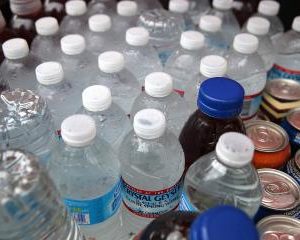By Sam Levin, the Guardian.
Americans drink enough bottled water each week to circle the globe two times around. That was one of the many alarming facts that motivated politicians in San Francisco to pursue a progressive environmental regulation no other major US city had dared – a ban on bottled water.
The liberal California city had previously led the way on banning plastic shopping bags, but the 2014 proposal to restrict bottled water was more modest. Although the board of supervisors voted unanimously to phase out the sale of single-use plastic water bottles, the rule only applied to city property.
“Given America’s addiction to plastic water bottles, we knew we had to be smart,” said David Chiu, a state assemblyman who introduced the measure when he was a San Francisco supervisor. “There were members of the public who couldn’t imagine life without plastic water bottles.”
So even though San Francisco is known as one of the most environmentally progressive cities in the country – the first in the US to pass a comprehensive mandatory recycling and composting law – officials limited the bottled water ban to city-owned land, leaving private businesses unaffected.
The ordinance, which has expanded in recent years, also bars the sale of bottled water at large events on city properties and prohibits San Francisco government agencies from purchasing plastic bottled water. Legislators also called for increased investment in water fountains, filling stations and event water hook-ups.
“San Francisco has wonderful, high-quality water,” said Tyrone Jue, senior advisor on the environment in the mayor’s office. “It’s more heavily regulated than the water you’re getting in bottles.”
Even limited to city property, the rollout of the law hasn’t always been easy. Banned from selling bottled water at city events, some vendors switched to alternatives that are also ecologically harmful, such as water in cans, glass bottles or other single-use containers.
“The packaging is as detrimental to the environment as the bottle in some ways,” said Suzanne Gautier, a manager with the San Francisco Public Utilities Commission, which helps event organizers comply with the law.
Earlier this year, the city expanded the law to restrict the sale or distribution of “packaged” water on city property, including sealed boxes, bags, cans and other containers with a capacity of one liter or less.
The city does not have data on the law’s impacts on plastic waste reduction in the region. But given the fact that plastic bottles take centuries to decompose and that the vast majority of bottles end up in landfills, any decrease in consumption is a step in the right direction, environmental campaigners said.
Chiu said he hoped the law could help shift the culture in California and beyond back to the habits that were common before bottled water exploded.
He noted that people often forget how rapidly private corporations took over drinking water. In 1976, the average American drank 1.6 gallons of bottled water a year – a number that skyrocketed to 28.3 gallons three decades later.
“The bottled water industry has spent millions of dollars to convince us that the only place you can get safe water is from a bottle, and that we need this product,” said Lauren DeRusha Florez, an associated campaign director with Corporate Accountability International, a nonprofit group that backed San Francisco’s measure.
More than 100 American cities have adopted measures to restrict government spending on bottled water, and bans have also spread at national parks and universities.
But Florez said San Francisco’s measure is particularly forward-thinking in the way it prioritizes increasing access to safe tap water, which is critical at a time when there are increasing concerns about contamination of water supplies in the US following the crisis in Flint, Michigan.
“The city is reinforcing water as a public good rather than a commodity that can be bought and sold by corporations.”
San Francisco is not currently exploring a broader citywide prohibition on bottled water, but following the success of major plastic bag bans across the country, environmental activists are increasingly turning their attention to bottles, Flores added.
“There’s a growing movement of folks who are looking for the next project.”
###



